Check the air quality in your area at an interactive EPA website.
While not everyone has the same sensitivity to wildfire smoke, it’s still a good idea to avoid breathing smoke if you can help it. And when smoke is heavy, which it can be in areas near active wildfires, it’s bad for everyone.
Air quality in many areas across the western United States has been rated unhealthy during recent fires, according to the Environmental Protection Agency. What does this mean and why is it important?
Smoke is a complex mixture of gases and fine particles produced when wood and other organic materials burn. The biggest health threat from smoke is from fine particles. Microscopic particles can penetrate deep into your lungs, causing a range of health problems from burning eyes and a runny nose to aggravated chronic heart and lung diseases. Exposure to particle pollution is even linked to premature death.
When air quality is unhealthy, people with heart or lung disease, smokers, children, pregnant women and the elderly should avoid heavy or prolonged exertion and limit time spent outdoors. People with asthma should follow their asthma management plan. People experiencing symptoms of heart or lung disease associated with smoke exposure should contact their healthcare provider.
Airnow.gov, an interactive map from the EPA, allows users to enter an address or ZIP code to find out the air quality in a specific area.
- HAZARDOUS: All children and adults should avoid or limit all outdoor exertion
- VERY UNHEALTHY: Active children and adults and people with respiratory disease such as asthma should avoid all outdoor exertion; everyone else, especially children, should limit outdoor exertion
- UNHEALTHY: Active children and adults, and people with respiratory disease such as asthma should avoid prolonged outdoor exertion; everyone else, especially children, should limit prolonged outdoor exertion
- UNHEALTHY FOR SENSITIVE GROUPS: Active children and adults, and people with respiratory disease, such as asthma, should limit prolonged outdoor exertion
- MODERATE: Unusually sensitive people should consider limiting prolonged outdoor exertion
If smoke is affecting you, you may have:
- Burning eyes, a runny nose, cough, phlegm, wheezing and difficulty breathing
- Chest pain, palpitations, shortness of breath or fatigue
- Coughing, phlegm, chest discomfort, wheezing and shortness of breath
Protect yourself:
- Limit your exposure, stay indoors, close windows and doors
- Talk with your health care provider, especially if you have heart, vascular or lung disease, including asthma
- Leave the area – if you’re in an area near a wildfire, be prepared to have a place to go if conditions become unhealthy
- Stock up on foods that do not require cooking as; frying and broiling can add to indoor pollution
- Purchase an air cleaner. Some room air cleaners can help reduce particle levels
- Wear a mask; N95 or P100 masks can be effective in minimizing smoke hazards
Resources
Get air quality information: If there is an active fire in your area, follow your local news, the airnow.gov website or your state air quality website for up-to-date information.
Only your doctor can advise you about your specific health situation. The EPA’s color-coded Air Quality Index can help you protect yourself when particle levels are high. See the Air Quality Guide for Particle Pollution for specific steps you can take.
Learn more about smoke and health: Wildfire Smoke, A Guide for Public Health Officials
For information about home air cleaners: Guide to Air Cleaners in the Home
For a list of certified air cleaning devices: California Certified Air Cleaning Devices
Learn the right way to use an N95 or P100 particulate respirator mask: Protect Your Lungs from Wildfire Smoke
What to do before, during, and after a wildfire: Centers for Disease Control and Prevention’s Wildfire Page
More information about Wildfires
This loss control information is advisory only. The author assumes no responsibility for management or control of loss control activities. Not all exposures are identified in this article. Contact your local, independent insurance agent for coverage advice and policy service. The content is not intended to be a substitute for professional medical advice, diagnosis, or treatment. Always seek the advice of your physician or other qualified health provider with any questions you may have regarding a medical condition.
The post How smoke from wildfires can affect your health appeared first on The Cincinnati Insurance Companies blog.
from The Cincinnati Insurance Companies blog https://ift.tt/2WkYGPw

Post a Comment
Post a Comment